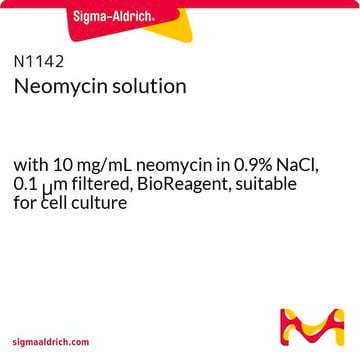SBR00022
Blasticidin S Ready Made Solution
10 mg/mL (20 mM HEPES), 0.22 μm filtered
About This Item
Recommended Products
Quality Level
sterility
0.22 μm filtered
Assay
≥98% (HPLC)
form
liquid
concentration
10 mg/mL (20 mM HEPES)
color
colorless to faint yellow
antibiotic activity spectrum
fungi
Mode of action
protein synthesis | interferes
storage temp.
−20°C
SMILES string
CN(CCC(CC(=O)NC1C=CC(OC1C(=O)O)N2C=CC(=NC2=O)N)N)C(=N)N.Cl
InChI
1S/C17H26N8O5.ClH/c1-24(16(20)21)6-4-9(18)8-12(26)22-10-2-3-13(30-14(10)15(27)28)25-7-5-11(19)23-17(25)29;/h2-3,5,7,9-10,13-14H,4,6,8,18H2,1H3,(H3,20,21)(H,22,26)(H,27,28)(H2,19,23,29);1H
InChI key
YQXYQOXRCNEATG-UHFFFAOYSA-N
Related Categories
General description
In research, Blasticidin S has become a valuable tool, notably as a marker for strain manipulations. Recent applications involve the use of Blasticidin S as a selection agent for cells carrying plasmids conferring blasticidin resistance. The resistance is mediated by the blasticidin S deaminase genes (bsr from Bacillus cereus or BSD from Aspergillus terreus). These genes produce enzymes that catalyze the hydrolytic deamination of the cytosine moiety in blasticidin S, leading to the formation of a non-toxic deaminohydroxy derivative. This resistance mechanism is crucial in various studies involving genetic manipulations and selections in cell biology and biochemical research.
Application
- studies to have fungicidal properties and prevents rice blast disease.
- used as a selection agent for transformed cells that contain the resistance genes bls, bsr, or bsd. Blasticidin S has been used to select HEK293-T cells with TLR-2 constructs and HEK-D5 cells.
- used to study protein synthesis at the level of peptide bond formation.
Biochem/physiol Actions
Antimicrobial Spectrum: Active against mycobacteria, several Gram-positive and Gram-negative bacteria
Features and Benefits
- High-quality antibiotic suitable for multiple research applications
- Ideal for Cell Biology and Biochemical research
Other Notes
Signal Word
Danger
Hazard Statements
Precautionary Statements
Hazard Classifications
Acute Tox. 3 Oral
Storage Class Code
6.1D - Non-combustible acute toxic Cat.3 / toxic hazardous materials or hazardous materials causing chronic effects
WGK
WGK 1
Flash Point(F)
Not applicable
Flash Point(C)
Not applicable
Certificates of Analysis (COA)
Search for Certificates of Analysis (COA) by entering the products Lot/Batch Number. Lot and Batch Numbers can be found on a product’s label following the words ‘Lot’ or ‘Batch’.
Already Own This Product?
Find documentation for the products that you have recently purchased in the Document Library.
Customers Also Viewed
Our team of scientists has experience in all areas of research including Life Science, Material Science, Chemical Synthesis, Chromatography, Analytical and many others.
Contact Technical Service









